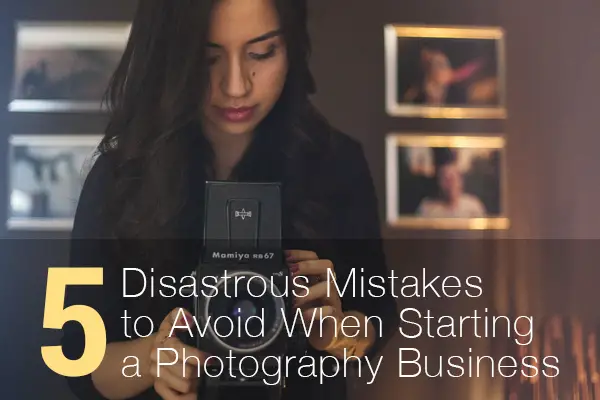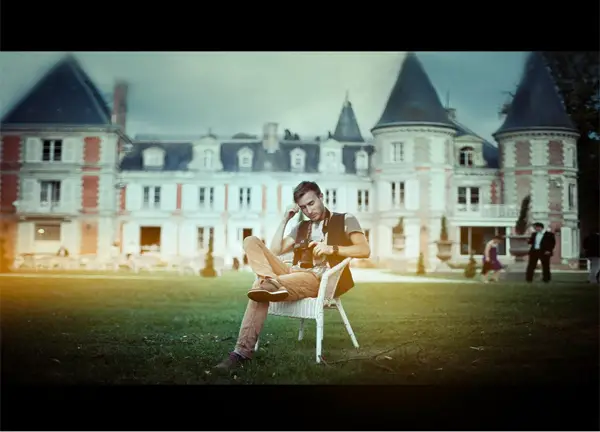While starting a photography business, people don’t always understand how to turn their hobby into a full-time job properly. Most newbie photographers make the same mistakes when starting out that they wish to go back and change. Knowing about these mistakes in advance could help you to avoid them.

As they say, “wise men learn by other men’s mistakes; fools by their own”. This saying reflects today’s topic the best. The mistakes I’m going to talk about are easy to avoid if you’re aware of them. So let’s go to the five photography mistakes every newbie could make while starting a business and also a few handy tips on how to avoid them in future.
1. Shooting for Free
Shooting for free is a big mistake that many newbies make. When you’re shooting for free, people don’t value your work as much as if they pay money for it. If people value your work, they would be less likely to cancel the session and would put more effort to prepare for it. People will take it more seriously, as it’s not just a hobby you pursue because you like it, but a job that should be properly paid.
When entering the photography business as a serious amateur who has discovered the potential to earn some money doing what you like, there’s nothing wrong with setting your own prices, even for your friends.
The main problem is that most newcomers fail to realize when they start charging for work that they crossed the line from amateur to a pro. This step also requires a change of thinking. It needs just a shift in perspective–from amateur to a serious business owner.

Instead of shooting for free, you may offer an option to buy a print album with session photos or digital pictures, with a discount from your normal price.
In some cases, free photo sessions are necessary, for instance, for TFP. TFP is “time for print” or “trade for print.” Time for print means the arrangement between model and photographer where the photographer provides the model with the best photos from the session, and the model gives a limited license in return for his/her time. These images can be used in your portfolio, advertising of any kind, business cards, articles for the web, and for many other situations you may need them.
So, if you seriously decide to turn your hobby into a full-time job, don’t hesitate to charge for your work carefully. Check out our previous guide on how to make the leap from “favor” to “job.”
2. Neglect of Accounting
One more mistake amateur photographers make while establishing their business is not setting any goals on how much money they want to make. An effective way to grow your business is to know for sure how much money you earn now, and how much money you would like to earn in the future.
Try to stay realistic about your photography financial targets. You should choose a figure that would be achievable with some hard work, but don’t undervalue your talent! A great place to start is just to figure out how much money you earned last year and add 30% of this amount on top. Then, create a plan of action you should do to reach this sum of money.

Also, count how many photo sessions per month you need, depending on your target income and average fee. You can start out with two to three photo sessions per month, and then increase your goals if you’re comfortable with the value. Don’t forget to leave yourself some time for rest, illness and recovery. You’re human, not a robot, for goodness sake!
Thinking of your huge goals, don’t forget about keeping track of all your numbers. Track your expenses along with earnings, so that you’re in the black. You can use various accounting software. For example, the program Wave is free, fast and an easy accounting solution for small businesses. It allows you to pull all your transactions from your business account bank statement into accounting software. Besides, one more cool feature all accounting software has is that you can download a report on how much, where and when you spend on your business.
3. Not Thinking Long-Term
This mistake is inherent to people who take each day as it comes, not thinking about the future. When you finally turned your hobby into a photography business that gives profits, you have clients, and everything is going just as it should be. Don’t relax! Photography is a business, just like other kinds of businesses. It’s competitive and mutable, and it requires that you stay up-to-date and improve your skills constantly (not just in photography, but in managing your business as well).
Life is development!
– Aristotle
Try to follow new trends in photography, your software and equipment. Shoot in new genres to get new skills. Surprise your clients with small gifts, such as fridge magnets and smartphone covers with your images, “thank you” cards after each session, business cards with photos, discounts and free coffee with long photo sessions. Clients would appreciate your care and tell their relatives and friends about you and, as a result, make word-of-mouth advertising work for you. Don’t stop what you have already archived; move forward all the time. Think about your goals, and set new ones to reach in the future.
4. Falling to Understand Your Subject
Photographers shoot a lot of types of images, as the evidence shows. Even if you’re focusing on landscape or wedding photography, there are some situations in life when you should work with a genre that is not familiar to you.

The most important thing in photography is having a subject. It is immensely important to understand your subject and what you are going to shoot. Know your subject, study what you want from the photograph and what you want it to look like.
Focus on one aspect of the subject and try to bring it out by photography the best you can. For example, if you’re shooting landscapes, you should learn the location first, figure out what time of the day would give the best natural light for shooting, learn different angles, and experiment. If you’re going to shoot a wedding this weekend, go to the location or google the best places around for taking pictures. Of course, sometimes the best pictures come out by chance, but it’s better to be prepared beforehand and know what to expect.
5. Being Afraid to Experiment
One of the most wonderful things in digital photography is the creativity you can engage in once your photo is uploaded into the computer. You can make a picture look any number of ways with various photo effects. Just take a look how a usual studio photo turns into a creative bokeh shot!

Newbie photographers are constantly looking for their personal style. Don’t look for it: Your style will find you. Implement in life the ideas that come to you as a photographer. If you stick to only what you know works, you’d never find a unique style. The things that you know work well are the things that other people have already done.
Insanity: doing the same thing over and over again and expecting different results.
– Albert Einstein
Photography is all about creativity. Don’t be afraid to experiment: move your camera, play around with zooming, overexpose your shots and try multiple exposures. In a word, you should go out of your comfort zone to become a successful photographer.
6. Bonus: Forgetting About Creative Freedom
I’m sure that most photographers working today will probably admit that they thought it was going to be easier than it turned out to be! Most newbies believe the rumors that photography makes a fast buck. Many think that, once a person buys a camera, he becomes a photographer at once. But in fact, running a professional photography business is not easy, as with any business in the world. There is no plan on how to “get rich quickly” in photography. You should go your own trial-and-error way.
Perhaps, these thoughts of “easy photography” stem from the photography itself. After all, the photography part of the job is not that hard, but it’s fun! Unfortunately, clicking the camera shutter takes only 20% of your business efforts. The other 80% is engaging with marketing, social media, accounting, studying, selling and so on.

Along with people who think that photography is easy money, there are other types of photographers who are obsessed with photography courses, ebooks and other educational materials. Moreover, they are more likely to depend on the opinions of other people.
Both of these ways are wrong. It’s really important to find a perfect balance. Remember that photographer is an artist and creator.
Last Word
So try to find your unique style, try new genres, experiment, please your clients, learn something new every day, stay patient and move to your goals.
What other mistakes would you add to this list? What would be the seventh mistake you want to warn other photographers about and how to avoid it? Let us know by putting a comment below.
Want to know how to start making profit? Sign up for our free email course using the awesome sidebar form! The course consists 7 professional lessons on how to awaken the pro photographer in you, start a photography business, and earn money with what you like!









It’s hard to take you seriously when you erroneously quote Albert Einstein, who in fact never said that. A bit of research may have saved that faux paus
Thank you for your feedback, Jay! I have to say that all my life I truly believed that the words “Insanity: doing the same thing over and over again and expecting different results.” belong to Albert Einstein. Your comment make me doubt, so I did a small research. I found the artcile with 9 Albert Einstein’ quotes that are fake: http://www.gizmodo.com.au/2014/03/9-albert-einstein-quotes-that-are-totally-fake/. And the one about insanity is one of them.
Otherwise, I also found an old New Yorker from 1925 that attributes the quote to Einstein here: http://books.google.com.ua/books?id=giwnAQAAIAAJ&q=insanity+%22expecting++a+different%22&dq=insanity+%22expecting++a+different%22&lr=&as_drrb_is=b&as_minm_is=0&as_miny_is=1000&as_maxm_is=0&as_maxy_is=1980&as_brr=0&cd=1&redir_esc=y
The other sources say that this quote may belong to Ben Franklin,
ancient Chinese proverb, and Rita Mae Browne. Who am I supposed to believe, Jay? Maybe, there is a chance you know the correct answer?
I agree it’s kind of ironic that a post about mistakes has a little mistake… but I think it’s unfair to judge the whole piece by this oversight.
I think Nancy hit the mark with this article!
I have to admit it took me a while before I got enough confidence to start charging money for my work. What helped me was a “money-back guarantee” system. When someone booked a photo session with me, they could take their money back if they didn’t like the final result. And guess what, no one asked to return their payment!
I suggest using this small trick if you’re tired of shooting for free but hesitate to ask ’em to pay you.